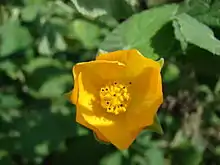Malveae
Malveae is a tribe of flowering plants in the mallow family Malvaceae, subfamily Malvoideae.[1] The tribe circumscribes approximately 70 genera and 1040 species and has the greatest species diversity out the three tribes that make up Malvoideae (followed by Hibisceae and then Gossypieae). The flowers of Malveae are five-merous with a characteristic staminal column, a trait found throughout Malvoideae. Although there are not many economically important species within Malveae, the tribe includes Althaea officinalis, otherwise known as the Marsh Mallow.
| Malveae | |
|---|---|
 | |
| Abutilon grandifolium | |
| Scientific classification | |
| Kingdom: | Plantae |
| Clade: | Tracheophytes |
| Clade: | Angiosperms |
| Clade: | Eudicots |
| Clade: | Rosids |
| Order: | Malvales |
| Family: | Malvaceae |
| Subfamily: | Malvoideae |
| Tribe: | Malveae |
| Genera | |
|
See text | |
The fruits of Malveae are generally schizocarpic, although some are functionally capsular. The tribe generally includes herbaceous plants, although Robinsonella includes some tree species. The tribe is a well supported monophyletic group, supported by chloroplast and ribosomal DNA.[2][3] Within Malvoideae, Malveae forms a monophyletic clade with Gossypieae, sister to Hibisceae. Malveae species are primarily found in the Americas, although genera within the tribe are also found in Eurasia, Australia, and Africa.[4]
The intergeneric relationships within Malveae are not well resolved. The tribe was originally split between Eumalveae, Malopeae, Sideae and Abutileae based on carpel arrangement, ovule numbers and the flowers' stigmatic arrangements,[5] however, now Malveae is generally grouped into 14 alliances (Abutilon, Batesimalva, Kearnemalvastrum, Malvastrum, Sphaeralcea, Modiola, Anoda, Gaya, Malope, Anisodontea, Malva, Sidalcea, Malacothamnus and Plagianthus). Recent ribosomal sequencing, however, suggests that these alliances are non monophyletic and may be better characterized by the presence or absence of involucre bracts (i.e., an epicalyx).[6] No new phylogenies have yet been proposed.
Genera
The following genera are recognized and as grouped from Bayer & Kubitzki(2003):[7][8][9]
| Alliance | Genera |
|---|---|
| Abutilon | Neobaclea, Corynabutilon, Tetrasida, Hochreutinera, Abutilon, Billieturnera, Pseudabutilon, Allowissadula, Wissadula,
Bastardiastum, Bastardia, Herissantia,Bastardiopsis, Robinsonella, Akrosida, Dendrosida, Allosidastrum, Rhynchosida, Krapovickasia, Malvella, Meximalva, Sidastrum, Sida |
| Anisodontea | Anisodontea |
| Anoda | Anoda, Periptera |
| Batesimalva | Batesimalva, Horsfordia, Briquetia, Fryxellia, Bakeridesia |
| Gaya | Gaya, Cristaria, Lecanophora |
| Kearnemalvastrum | Kearnemalvastrum |
| Malacothamnus | Phymosia, Malacothamnus, Neobrittonia, Iliamna |
| Malope | Kitaibelia, Malope |
| Malva | Alcea, Althaea, Malva, Lavatera |
| Modiola | Modiola, Modiolastrum |
| Malvastrum | Malvastrum |
| Plagianthus | Hoheria, Lawrencia, Plagianthus |
| Sidalcea | Callirhoe, Sidalcea |
| Sphaeralcea | Sphaeralcea, Tarasa, Fuertesimalva, Calyculogygas, Monteiroa, Calyptraemalva, Napaea, Eremalche, Sidasodes, Acaulimalva, Palaua, Nototriche |
|
|
|
|
References
- "Malvaceae Juss., nom. cons. subfam. Malvoideae tribe Malveae". Germplasm Resources Information Network. United States Department of Agriculture. 2007-04-12. Retrieved 2010-05-27.
- Alverson, W. S.; et al. (1999). "Phylogeny of the Core Malvales: Evidence from NdhF Sequence Data". American Journal of Botany. 86 (10): 1474–1486. doi:10.2307/2656928. JSTOR 2656928. PMID 10523287.
- Baum; et al. (2004). "Phylogenetic Relationships of Malvatheca (Bombacoideae and Malvoideae; Malvaceae Sensu Lato) as Inferred from Plastid DNA Sequences". American Journal of Botany. 9 (11): 1863–1871. doi:10.3732/ajb.91.11.1863. PMID 21652333.
- Kubitzski; Bayer (2003). The Families and Genera of Vascular Plants. Springer. pp. 225–311.
- Bentham; Hooker (1862). Genera plantarum. pp. 195–213.
- Tate; et al. (2005). "Phylogenetic Relationships Within the Tribe Malveae (Malvaceae, Subfamily Malvoideae) as Inferred from ITS Sequence Data" (PDF). American Journal of Botany. 92 (4): 584–602. doi:10.3732/ajb.92.4.584. hdl:10261/24879. PMID 21652437.
- "Genera of Malvaceae tribe Malveae". Germplasm Resources Information Network. United States Department of Agriculture. Retrieved 2017-05-02.
-
 Data related to Malveae at Wikispecies
Data related to Malveae at Wikispecies - Hinsley, Stewart (2009). "Malvaceae".
External links
| Wikimedia Commons has media related to Malveae. |
 Data related to Malveae at Wikispecies
Data related to Malveae at Wikispecies